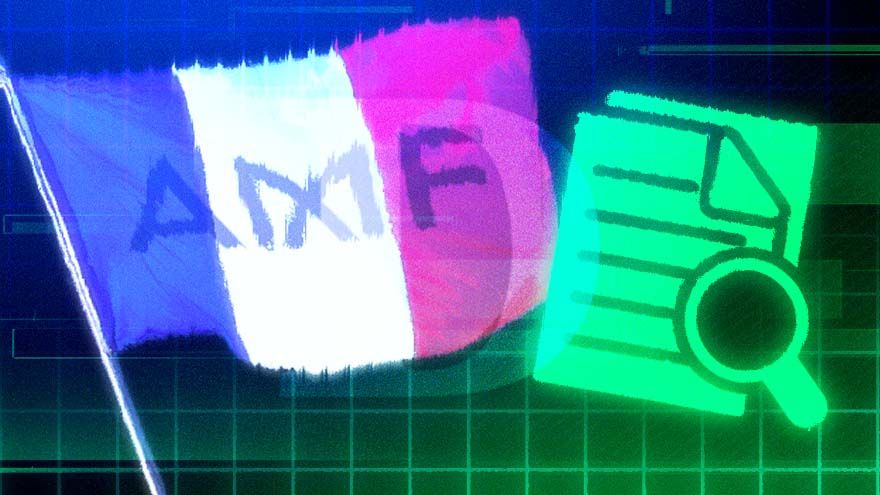
With The World’s Largest Exchanges At Odds With U.S. Regulators, Overseas Agencies Foster Friendlier Climate.
While U.S. regulators crack down on the crypto industry, the opposite is happening abroad. The latest sign that jurisdictions outside of the U.S. are seeking a friendlier approach comes from France.
The Autorité des Marchés Financiers (AMF), the regulatory body that oversees French financial markets, published a paper that “aims to provide a definition of what constitutes DeFi, providing a high‐level overview of the sector.” The document includes insight into trends and risks in the industry.
Pressure from U.S. regulators is pushing businesses abroad as conditions prove more conducive to development and fundraising. From Europe to Asia, legislators are seeking to capitalize on the U.S.’s loss by driving a growing industry to their shores with friendlier–or at the very least clearer–regulation.
The French Connection
In its document, the AMF indicated support for “the development of a global coordinated approach towards regulation to ensure a global level‐playing field, which should both aim to protect investors and foster innovation.”
“With DeFi still being at an early stage of development, yet evolving rapidly as a sector, legislation should be thought in a progressive and proportionate manner, taking into account, on the one hand, the benefits to innovation displayed by DeFi activities and governance models, while on the other considering the risks they pose to participants,” said the document.
Still, with DeFi platforms come broad risks regulators must take into account, such as anti-money laundering and counter-terrorist financing compliance and any due diligence around know-your-customers (KYC) rules, according to the AMF.
For regulators, the AMF said the challenge is two-fold. “Allowing for the development of transparent and secure means to help grow the ecosystem and encourage innovation on the one hand, whilst providing adequate levels of investor protection on the other.”
In an effort to open lines of discussion with public and private ecosystem stakeholders and “foster the development of a balanced regulatory approach,” the AMF is seeking feedback on the paper before Sept. 30.
Hong Kong Research
To potentially capture a share of the crypto business, Hong Kong regulators have already proceeded to put into effect legislation designed to entice newcomers and serve a large existing base of digital asset firms.
A Hong Kong legislators-sanctioned study focused on worldwide efforts to accelerate Web3 development in a number of countries identified as “regional hubs” including Japan, Singapore, South Korea, and the United Arab Emirates.
“There remain concerns over Hong Kong lagging behind in Web 3.0 development,” said researchers, citing a noticeable uptick of activity in Asia and the Gulf region which in turn is driving Hong Kong’s competitive approach.
Companies like Hong Kong-based entity First Digital are part of this drive. The firm announced on the 1st of this month that it would release a U.S. dollar-pegged stablecoin on Ethereum and BNB.
A Push Across APAC
Meanwhile in Japan, crypto exchanges are preparing to request that regulators lift restrictions on leveraged trading. Currently, customers may, at maximum, only double their exposure via borrowed assets, as outlined in a Bloomberg report citing the Japan Virtual and Crypto Assets Exchange Association.
To increase that limitation, a proposal may be ready for Japanese regulators in the Financial Services Administration as soon as next month, according to the crypto asset association’s Vice Chairman, Genki Oda.
The cryptocurrency exchange Gemini is also looking to expand in the Pacific region with the announcement of a 12-month-long expansion effort, including a 100-person hiring campaign for the company’s Singapore offices and the development of an engineering center in India.
“We believe that APAC will be a great driver of the next wave of growth for crypto and Gemini,” said a Gemini blog post.
Read More: thedefiant.io








 Bitcoin
Bitcoin  Ethereum
Ethereum  Tether
Tether  XRP
XRP  Solana
Solana  Dogecoin
Dogecoin  USDC
USDC  Cardano
Cardano  Lido Staked Ether
Lido Staked Ether  TRON
TRON  Avalanche
Avalanche  Sui
Sui  Wrapped stETH
Wrapped stETH  Chainlink
Chainlink  Toncoin
Toncoin  Shiba Inu
Shiba Inu  Stellar
Stellar  Wrapped Bitcoin
Wrapped Bitcoin  Hedera
Hedera  Polkadot
Polkadot  WETH
WETH  Bitcoin Cash
Bitcoin Cash  Uniswap
Uniswap  Pepe
Pepe  Hyperliquid
Hyperliquid  LEO Token
LEO Token  Litecoin
Litecoin  Wrapped eETH
Wrapped eETH  NEAR Protocol
NEAR Protocol  Ethena USDe
Ethena USDe  USDS
USDS  Internet Computer
Internet Computer  Aptos
Aptos  Aave
Aave  Mantle
Mantle  Bittensor
Bittensor  Virtuals Protocol
Virtuals Protocol  Cronos
Cronos  POL (ex-MATIC)
POL (ex-MATIC)  Ethereum Classic
Ethereum Classic  Render
Render  Artificial Superintelligence Alliance
Artificial Superintelligence Alliance  MANTRA
MANTRA  Arbitrum
Arbitrum  Ethena
Ethena  Tokenize Xchange
Tokenize Xchange  WhiteBIT Coin
WhiteBIT Coin